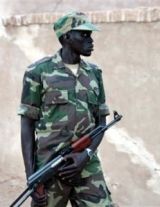Pro-Khartoum Arabs see red over plans for disputed oil district of Abyei
KHARTOUM, July 19 (AFP) — The boundaries proposed by an international commission for the disputed Sudanese oil district of Abyei sparked an angry reaction from local supporters of the Khartoum government Tuesday.

|
|
A solider from the Sudan People Liberation Army (SPLA) stands guard at a camp in Khartoum, Sudan, Monday, July 18, 2005. (AP). |
Under a January peace deal between the government and southern rebels of the Sudan People’s Liberation Army, the district is one of three granted a special status during six years of interim autonomy in the south, leading up to a referendum on independence.
Misariyah Arab nomads, who formed pro-government militias during the two-decade war between Khartoum and the SPLA, rejected the recommendations of the panel chaired by former US ambassador Donald Peterson, as did the district’s current administration.
“The Misariyah, as Sudanese, stand for unity and… declare their absolute rejection of the report of the Abyei Demarcation Commission and urge the presidency to take fair and serious decisions based on the documents that prove their historic and inherited right,” the Misariyah General Union said.
“We declare our adherence to the 1956 (independence) boundaries which have been defined by historical international conventions and we reject all plans aimed at annexing Abyei to a region that isolates it from its historic and geographic environment.”
The report was also rejected by the Abyei Legislative Council which slammed it as “biased, dishonest and full of lies”.
The Khartoum government, which had five members on the 15-member commission, the same as the SPLA, said it was still discussing the report but expressed confidence it would not unravel January’s landmark deal.
“The report will not pose a threat to the peace agreement,” said Foreign Minister Mustafa Osman Ismail.
Abyei’s fate was one of the main stumbling blocks in years of tortuous negotiations between the government and the SPLA that culminated in the peace deal, under which the south will vote on independence after six years of interim autonomy.
Under an agreement reached in May last year, special provisions apply to Abyei and two other disputed districts on the north-south border — the Nuba mountains and southern Blue Nile state.
The accord provides for an elected Executive Council to administer Abyei during the interim period, with a “special administrative status” allowing residents to vote in both north and south Sudan.
It also establishes a formula for sharing out oil revenues from the distict and provides for a separate referendum in Abyei in 2011 on whether the district wants to join the north or south.
Abyei was heavily depopulated during the civil war — Africa’s longest-running conflict.
It formed part of the south until a British colonial reorganization in 1905, and its main population apart from the Misiriyah is Dinka, the same ethnic group as SPLA leader John Garang.
